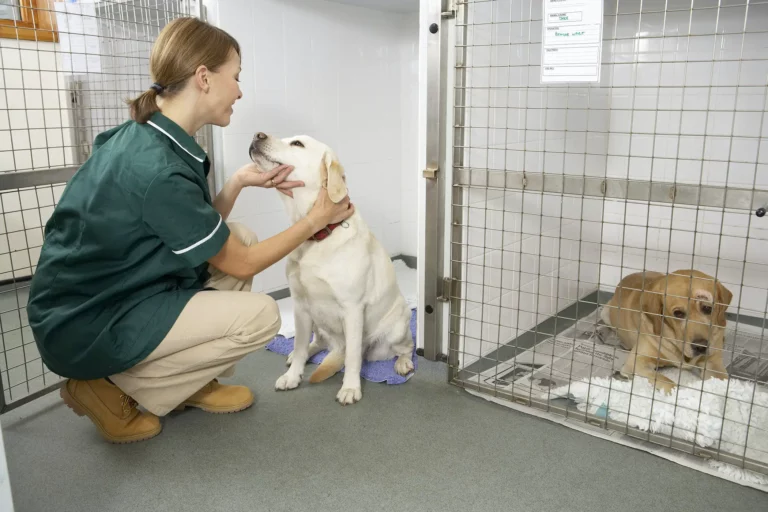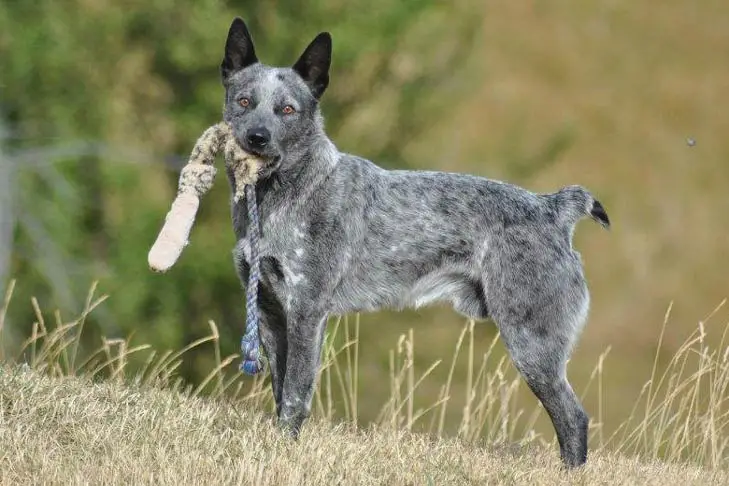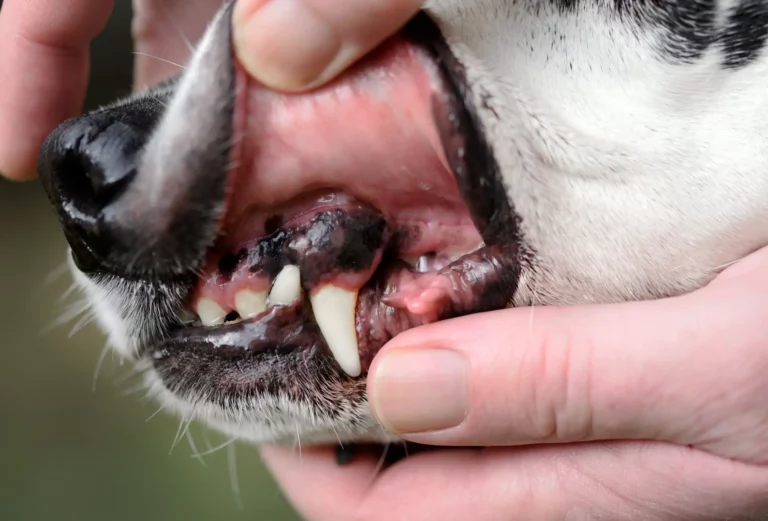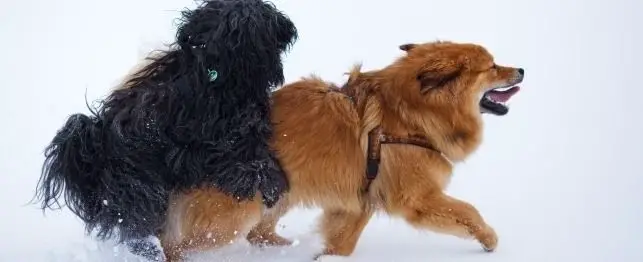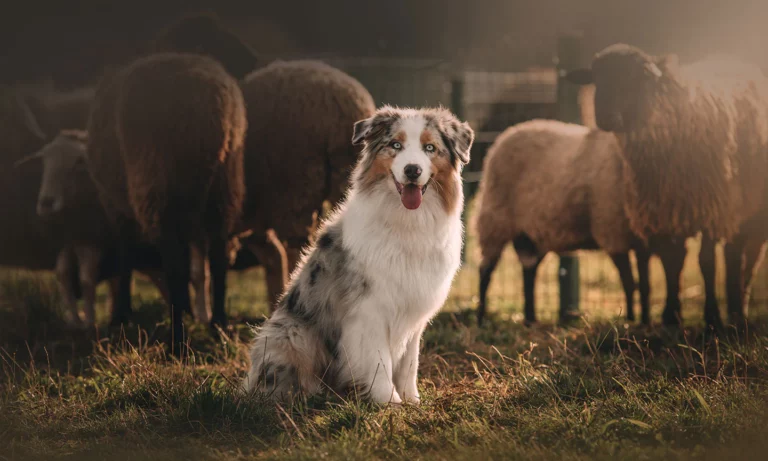Why Does My Dog Only Eat at Night? (5 Reasons & Solutions)
As a dog owner, you may have noticed a peculiar eating habit in your furry friend—only eating at night. This can be concerning, as it deviates from the usual eating patterns most dogs follow. You may be left wondering if this behavior is normal or if it might indicate a potential problem.
Understanding why your dog prefers to eat at night is crucial for ensuring their well-being and addressing any underlying issues. By gaining insight into the possible reasons behind this night-time eating, you can take appropriate measures to help your dog maintain a healthy diet and lifestyle.
In this blog post, we will explore the factors that might influence your dog’s nocturnal eating habits and provide practical advice for managing this behavior.
Key takeaways
Some dogs prefer night-time eating due to instinctual behaviors.
Changes in routine can shift eating habits.
Eating at night may be related to your dog’s comfort and security.
Medical issues could affect eating patterns; consult a vet if concerned.
Consistent feeding routines can aid in normalizing meal times.
Potential Reasons for Nocturnal Eating Habits
1. Ancestral instincts
Evolutionary adaptation: It’s important to remember that dogs have evolved from wild ancestors who often hunted and scavenged for food during night-time hours. This was due to the cooler temperatures and reduced visibility, which allowed them to avoid predators and competitors. As a result, some domesticated dogs may still carry this nocturnal feeding instinct.
Wild canine behavior: Nocturnal feeding habits can also be traced back to the behaviors of wild canines, such as wolves and foxes. These animals tend to hunt and eat under the cover of darkness to avoid competition and ensure the safety of their pack. Your dog’s preference for nighttime eating could be a remnant of these wild instincts.
2. Environmental factors
Daytime distractions and noise: Your dog may choose to eat at night due to distractions in their environment during the day. Loud noises, people coming and going, or other pets in the household can create a stressful atmosphere, leading your dog to postpone eating until night-time when things are quieter and calmer.
Cooler temperatures at night: Just like their wild counterparts, some dogs may prefer to eat at night because of the cooler temperatures. Eating generates heat, and if your dog is sensitive to heat or lives in a particularly hot climate, they may instinctively opt for nighttime feeding when it’s more comfortable.
3. Feeding routines and habits
The impact of the owner’s schedule: Your dog’s night-time eating habits may be influenced by your own daily routine. If you work late hours or have an inconsistent schedule, your dog may adapt by adjusting their feeding times to coincide with your availability.
Establishing a consistent feeding schedule: Dogs thrive on routine, and if they haven’t been given a consistent feeding schedule, they may develop a preference for eating at night. It’s essential to establish a regular mealtime for your dog to help prevent this behavior.
4. Medical issues
Gastrointestinal issues: Some dogs may choose to eat at night due to underlying gastrointestinal problems. For example, acid reflux or stomach discomfort can cause them to avoid eating during the day, leading them to consume food at night when they feel better.
Dental problems: Dental issues, such as tooth pain or gum disease, can make eating uncomfortable for your dog. They may opt to eat at night when there are fewer distractions, and they can take their time to chew carefully.
Age-related changes: As dogs age, they may experience changes in their metabolism or appetite. Older dogs might find it more comfortable to eat at night due to decreased daytime energy levels or changes in their sleeping patterns.
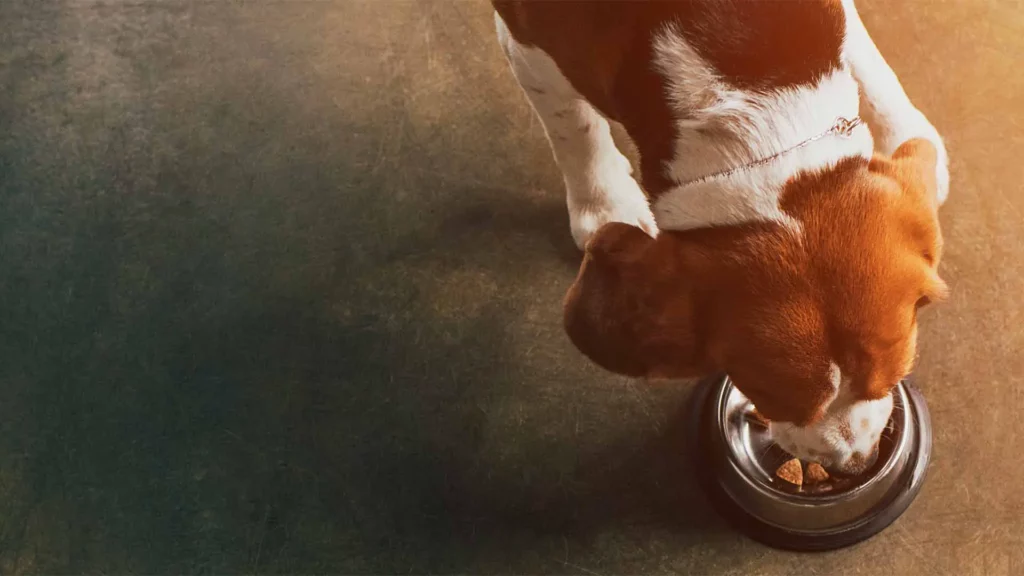
5. Psychological factors
Anxiety and stress: Dogs experiencing anxiety or stress may avoid eating during the day when there is more activity and stimulation. They might choose to eat at night when they feel more relaxed and secure in their environment.
Attention-seeking behavior: Some dogs may develop night-time eating habits as a way to seek attention from their owners. If you tend to be more available or responsive at night, your dog could associate eating with receiving your attention and affection.
What is my dog thinking?
This could be an instinctive behavior rooted in their wild ancestors, who would hunt and eat at night to avoid predators.
Addressing Your Dog’s Nocturnal Eating Habits
1. Rule out medical issues
Importance of consulting a veterinarian: Before making any changes to your dog’s feeding routine or environment, it’s crucial to rule out any underlying medical issues. Consult with your veterinarian to discuss your dog’s nocturnal eating habits and perform a thorough examination to identify and address any health concerns.
Identifying and treating underlying problems: If your dog’s night-time eating is caused by a medical issue, treating the underlying problem should help resolve their unusual eating habits. Your veterinarian may recommend dietary changes, medications, or other interventions to improve your dog’s overall health and well-being.
2. Adjusting the feeding schedule
Gradual changes in mealtimes: If your dog’s nocturnal eating habits are due to a lack of routine or an owner’s inconsistent schedule, work on gradually adjusting their mealtimes. Slowly shift their feeding schedule to earlier in the day by offering meals 15-30 minutes earlier each day until you reach the desired mealtime.
Consistency and predictability: Once you’ve established a new feeding schedule, be consistent and predictable. This will help your dog feel secure and reinforce their new eating habits. Avoid offering food outside of these scheduled mealtimes to prevent confusion and ensure their needs are met during the day.
3. Creating a peaceful eating environment
Reducing distractions during daytime feeding: To encourage your dog to eat during the day, create a calm and quiet environment for mealtimes. Minimize distractions by turning off the TV, keeping other pets or family members away from the feeding area, and providing a designated eating space where your dog feels comfortable and secure.
Providing a designated eating space: Establish a specific area in your home for your dog’s meals, ideally away from high-traffic or noisy areas. This will help them associate the designated space with mealtimes and encourage them to focus on eating during the day.
4. Encouraging daytime eating
Positive reinforcement and praise: Reward your dog with praise and affection when they eat during the day. Positive reinforcement will help them associate daytime eating with positive experiences, making them more likely to maintain the new routine.
Mealtime enrichment and stimulation: Make mealtimes more engaging for your dog by offering interactive feeding toys or puzzle feeders during the day. These can help keep them mentally stimulated while encouraging them to eat at the appropriate times.
5. Seeking professional help
If your dog’s night-time eating habits persist despite your efforts, consider consulting with a canine behaviorist. They can help identify any underlying psychological factors and provide tailored recommendations to address your dog’s unique needs.
Remember that each dog is different, and what works for one may not work for another. Be patient and persistent in trying various approaches to help your dog transition to a healthier eating schedule. With time and dedication, you can help your dog overcome their nocturnal eating habits and enjoy a happier, healthier lifestyle.
Final Thoughts
We have explored various factors that may influence your dog’s nocturnal eating habits, including ancestral instincts, environmental factors, feeding routines, medical issues, and psychological factors. By addressing any underlying health concerns, adjusting feeding schedules, creating a peaceful eating environment, and encouraging daytime eating with positive reinforcement, you can help your dog develop healthier eating habits.
As a dog owner, it’s natural to feel concerned when your furry friend exhibits unusual behaviors like eating only at night. However, with patience, understanding, and proper care, you can effectively manage your dog’s nocturnal eating habits and ensure their overall well-being. Remember that each dog is unique, and finding the right solution may take time and persistence. By working closely with your veterinarian or a canine behaviorist, you can help your dog enjoy a happier, healthier life with a more balanced eating schedule.
Frequently Asked Questions
Is it harmful for my dog to eat only at night?
Eating only at night is not inherently harmful for your dog. However, nocturnal eating habits can sometimes indicate an underlying issue, such as a medical condition or anxiety. It is essential to identify and address any potential problems to ensure your dog’s overall health and well-being. Additionally, adjusting your dog’s feeding schedule to include daytime meals can help maintain a balanced routine and provide them with consistent energy throughout the day.
Can changing my dog’s diet help with their nocturnal eating habits?
Changing your dog’s diet may help with their nocturnal eating habits if the current diet is contributing to a medical issue, such as gastrointestinal discomfort or dental problems. Consult your veterinarian before making any changes to your dog’s diet, as they can help identify the root cause of the issue and recommend an appropriate diet plan to address it. In some cases, a more digestible, higher quality, or specialized diet may help alleviate the issue and encourage daytime eating.
How can I tell if my dog’s night-time eating is due to anxiety or stress?
Signs of anxiety and stress in dogs can include excessive panting, pacing, trembling, excessive licking, or changes in appetite, such as nighttime eating. If you notice these signs in your dog, particularly during the day, their nighttime eating habits may be related to anxiety or stress. Observe your dog’s behavior throughout the day to identify any triggers or patterns that may contribute to their anxiety. Consult with a veterinarian or canine behaviorist for guidance on how to help your dog cope with anxiety or stress and develop healthier eating habits.
My dog is a rescue with a history of night-time eating, what can I do?
For a rescue dog with a history of night-time eating, it’s crucial to approach the situation with patience and understanding. Your dog may have developed this habit due to past experiences or trauma. Begin by establishing a consistent feeding schedule and providing a calm, designated eating area for your dog. Gradually adjust their feeding times to encourage daytime eating and use positive reinforcement to create positive associations with daytime meals. It may take time for your rescue dog to adjust to their new environment and routine. If you’re struggling to make progress, consider consulting with a veterinarian or canine behaviorist for expert guidance and tailored solutions.

